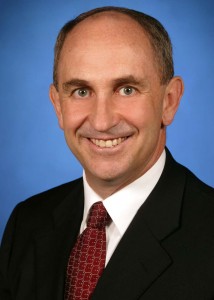The new Chief Financial Officer of General Motors Company, Chris Liddell, says the maker has a “reasonable chance” of returning to profitability this year.
If it happens – this would end an earnings drought that has totaled $88 billion in losses from 2005 through last year’s first quarter.
Liddell, a New Zealander, came to GM after serving as Microsoft’s Chief Financial Officer since May of 2005.
His background is relatively diverse by Detroit standards, and includes a stint as CFO of International Paper Company. Prior to that, Liddell served as CEO of Carter Holt Harvey, which was, at the time, one of New Zealand’s largest publicly traded firms.
Liddell replaced Ray Young in January, who became GM’s vice president of international operations the next month. His immediate, 13-hour a day, job is pulling together “fresh start accounting,” for the loss-making and newly reorganized company.
This gargantuan task, Liddell says, will result in financial statements that are “thorough, structured and competent.” GM is also supplying regular reports to the U.S. government, and he is not sure if this is more onerous than reports required from publicly traded companies.
Liddell observed, tongue firmly in cheek, that of all the options he was considering last fall when he was recruited, including becoming the head of a company, GM was “the hardest job, with the least amount of pay and probably the toughest situation of all the ones I was looking at. But other than that the decision was an entirely rational one.”
Liddell’s compensation package includes not only $750,000 in annual salary, but also nearly $5.5 million more in stock. Of course, that depends on GM pulling off an initial public offering (IPO), which would list the company on a major exchange, allowing it to trade stock.
As to when publicly traded becomes applicable again, GM needs to be profitable to undertake an IPO, which is “possible in the second half,” of 2010 said Liddell, who was meeting with media for the first time during a breakfast at GM headquarters in Detroit.
However, the affable Kiwi qualified his comments on IPO timing with carefully chosen observations that included the strength of GM vehicle sales and their future prospects at the time of the offering.
The strength of the financial markets and their ability to absorb what will be a large public offering of the company are also big factors. GM is more than 60% owned by U.S. and Canadian taxpayers,
“I wouldn’t go further than possible… the timing has to be right,” Liddell says.
One area where Liddell did not hedge, though, was countering the claims by ex U.S. Treasury official, Steven Rattner, who claimed that GM’s financial staff was incompetent. (Click Here.)
“At GM, we faced a bigger management challenge than even its reputation led us to expect. Take, for example, the lack of financial discipline. We saw no indication of the finance staff pushing back on the operating divisions to achieve better results, as is customary. Analyses seemed engineered to support pre-ordained conclusions. Symbolically, we never heard the words shareholder value,” said Rattner last fall at a speech in Washington.
“The financial organization at GM was not as bad as characterized,” Liddell, says. “Certainly it is in a rebuilding process, as in fact a large part of the business is from a management point of view.”
He maintains he is “reasonably heartened” by the quality of the team over here. “It is not a situation where I have to rebuild the whole team.”
Liddell summarized his job as one “to simplify and speed things up, while minimizing the overhead” required to develop vehicles.
When he was at Microsoft, Liddell drove a Ferrari California to work every day, switching to winter tires as the seasons changed in Redmond. “I never understood why people buy a beautiful car like that and then stick it in the garage.”
At the moment he is working his way though the GM line. It was not clear if he has been in a Corvette yet. In New Zealand you can get you license at age 15. “I think got mine at 15 and one day.”


